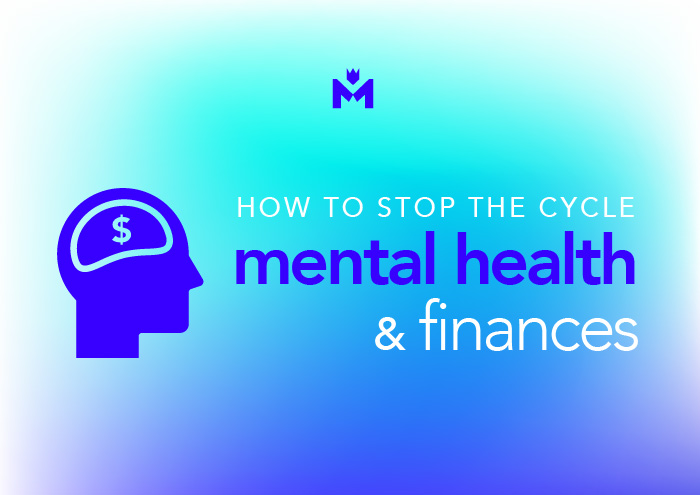Which came first – the mental health issues affected by financial problems, or the financial problems affected by mental health issues? It’s hard to say, but one thing we do know is that your finances and mental health are intrinsically linked. As we outlined in part one of our Money and Mental Health series, people in debt are more likely to be depressed, and people who are depressed are more likely to get themselves in debt.
What is the Money and Mental Health cycle?
If you have sufficient money for your needs, then that’s one less thing to stress over. When you’re stressed, it has a flow-on effect on your mental health. Stress can cause problems like poor sleep, susceptibility to illnesses, and may also lead to substance abuse to help you cope (or escape). All of these things can contribute to or exacerbate mental health challenges such as depression or anxiety.
These in turn can result in performance issues, like poor concentration, a downturn in confidence, and a fear of confrontation that can lead to issues at work, potentially impacting on your earning ability.
Depression is no respecter of boundaries
According to Depression.org.nz, about one in five women and one in seven men in New Zealand suffer from some form of depressive or anxiety disorder. While money isn’t always a contributor, there are studies galore, like this one from the University of Southampton, UK, which specifically links problem debt to an increase in mental health problems. And these problems just don’t go away by hiding from them. Being afraid to open the credit card bill, or not answering the phone in case it’s your bank, won’t get those debts paid – and, in fact, can make the problem much worse.
You’re not alone
You don’t need to be afraid though. There are many services out there to help you get both your finances on track and your mental wellbeing looked after. If you’re in debt but have some big goals to achieve, then a financial advisor might be the right person to turn to. Or if that feels a little intimidating right now, check out the services offered by the New Zealand Government on their website. The Citizens Advice Bureau (CAB) offers budgeting and money management services. They will also liaise with government departments such as Work and Income to help find out if you are entitled to financial assistance. If you want to work out your budget, check out the debt calculation tools on Sorted.org.nz.
When it comes to mental health, we’re by no means the experts – but information and help can be found via the Mental Health Foundation website or by calling Lifeline on 0800 543 354.
Now to the future…
So you’re out of debt (or getting there), your credit rating is at a sensible level, and you can look your bank manager in the eye. As a result, you’re more resilient mentally and have proved that you can cope with crises. You’ve taken control over your finances, and this flows on to having control over your stress. You don’t want to have to go through that again, so where to from here?
Some basic advice:
- Make a budget and stick to it.
- Allow for emergencies. Even putting a few dollars aside a week can make a difference.
- Learn to say no. Buy only what you can afford.
- Shop around and look for discounts.
- Restructure your debt to suit your personal situation and create some financial alleviation (get in touch if you need help with this)
- Join Kiwisaver. Not only are you able to save towards your retirement or your first home, but your employer and the government make contributions as well. It’s like an instant pay rise. If you find you can’t afford your payments, apply for a “contributions holiday” (check out how to do this on the Kiwisaver website). But keep these as short as you can – you’re missing out on free money otherwise.
- Get insurance to protect you should the worst happen. The younger you are when you first take out a health-related insurance policy (whether income or medical), the better your chances are of receiving a payout, because it isn’t likely that you would have any pre-existing conditions that might affect your entitlement.
These are just some of the ways you can avoid money problems in the future. But for now, understand that there is a way to break the cycle. If you need any help at all with getting your finances under control and back on track to helping you build your empire, just let us know.
Otherwise, share this with a friend or family member who you think might find it valuable – and most importantly, take care of yourself and your mental wellbeing. We might be financial advisers, but we know that money is not the be all and end all.
Remember, it’s never too late to get help.
WHERE TO GET HELP:
Lifeline – 0800 543 354 or (09) 5222 999 within Auckland
Depression Helpline – 0800 111 757 or free text 4202 (to talk to a trained counsellor about how you are feeling or to ask any questions)
Anxiety phone line – 0800 269 4389 (0800 ANXIETY)




